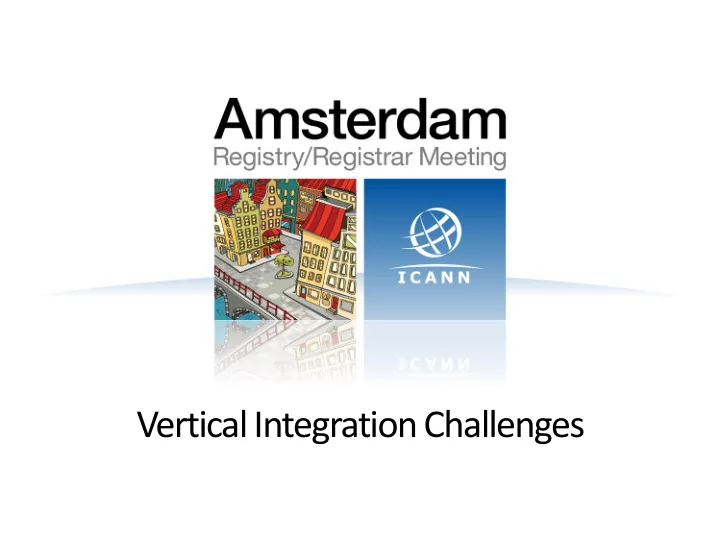

Vertical Integration Challenges
Panel Jeff Neuman, Neustar, Inc. Jeff Eckhaus, Demand Media, Inc. Chuck Gomes, Verisign, Inc. 2
Background • Prior to the introduction of new gTLDs, ICANN generally prohibited cross ownership of registries and registrars (with few exceptions). Never prohibited registrars from owning registries; just registries from owning registrars • ICANN’s development of new gTLDs presented the need for more diverse business models; community expressed interest in revisiting cross- ownership contractual limitations. In 2008-2009, ICANN commissioned economic studies on vertical • integration. A policy development process was held in 2010 which proved to be • inconclusive. 3
Background (continued) • In November 2010, ICANN Board concluded: …so long as certain restrictions were put into place on the conduct of registries and registrars, specifically as they relate to data, and so long as competition review remained available in the event of concerns regarding market power – there was no economic support to restrict, on an across-the-board basis, the ability of registries to hold ownership interests in registrars, and vice versa. A version of the code of conduct was posted in the draft Applicant • Guidebook released in November 2010; Only minor revisions accepted. Final Applicant Guidebook Specification 9 entitled the “Registry Operator • Code of Conduct. See http://newgtlds.icann.org/en/applicants/agb/base- agreement-specs-04jun12-en.pdf. 4
Code of Conduct • Section 1: No Registry Related Party shall not 1(a): Discriminate in the Provision of Registry Services – Standard 1(b): Register domain names in its own right, except through an ICANN accredited registrar, that are reasonably necessary for the management, operations and purpose of the TLD, provided, that Registry Operator may reserve names. Does it really say that a Registry cannot register names (even through a registrar) if it is not “reasonably necessary for the management, operations and purpose of the TLD? What does that even mean? But you can just get around it all by reserving the name? Sum: If you reserve a name, you can activate it and use it. If you do not reserve the name, but decide a year later, you cannot register the name unless it is “reasonably necessary for the management, operations and purpose of the TLD? 5
Code of Conduct • Section 1: No Registry Related Party shall 1(c): Engage in Front Running - using Whois queries to register names in advance 1(d): “allow any Affiliated registrar to disclose user data to Registry Operator or any Registry Related Party, except as necessary for the management and operations of the TLD”….unless everyone else can get the data. New term “User Data”; What does this mean? “Necessary for the management and operations of the TLD”? Does this mean individualized user data or does it also apply to data in the Aggregate? 6
Code of Conduct • Section 1: No Registry Related Party shall 1(e): disclose confidential registry data or confidential information about its Registry Services or operations to any employee of any DNS services provider except as necessary for the management and operations of the TLD” unless everyone can get the data. “Confidential registry data”, “Confidential Information” – More new terms? “DNS services provider” Who is that? Any employee of a DNS provider? What if an organization is both a Registry Related Party and a DNS Provider – Does that mean they cannot disclose information to themselves? Section 2: Separate Legal entity with separate books and records • How separate is separate? Can you have common support functions (legal, billing, customer support, HR, finance, engineering, QA teams, Data Warehouse, marketing, PR, etc.) What about a common parent organization / common board – What can be disclosed to them? 7
Code of Conduct • Section 3: Audits Registry Operator will conduct internal reviews ….to ensure compliance with this Code of Conduct and provide results to ICANN and Exec Officer certification (which ICANN can make public). Implies you have to do this every year regardless of whether you are vertically integrated. Any guidance from ICANN on what reviews they expect? Section 4 & 5: Legal Disclaimers • • Section 6: Exemption from the Code of Conduct Registry Operator may request an exemption to this Code of Conduct, and such exemption may be granted by ICANN in ICANN’s reasonable discretion, if Registry Operator demonstrates to ICANN’s reasonable satisfaction that (i) all domain name registrations in the TLD are registered to, and maintained by, Registry Operator for its own exclusive use, (ii) Registry Operator does not sell, distribute or transfer control or use of any registrations in the TLD to any third party that is not an Affiliate of Registry Operator, and (iii) application of this Code of Conduct to the TLD is not necessary to protect the public interest. 8
Code of Conduct Exemption • You can request exemption? How? When? Will this hold up contract negotiations? • You have to demonstrate to ICANN satisfaction that you are in compliance. How do you do that? “All domain names are registered to, and maintained by, Registry Operator • for its own exclusive use”? Does everyone have a common understanding of this? May not “sell, distribute or transfer control or use of any registrations in • the TLD to any third party that is not an Affiliate of Registry Operator” Does everyone have a common understanding of this? “Application of this Code of Conduct to the TLD is not necessary to protect • the public interest. “ ?????????????????????? 9
Real Life Issues for Integrated Entity “If Registry Operator or a Registry Related Party also operates as a provider of registrar or registrar-reseller services, Registry Operator will, or will cause such Registry Related Party to, ensure that such services are offered through a legal entity separate from Registry Operator, and maintain separate books of accounts with respect to its registrar or registrar-reseller operations. “ • If we maintain separate books of accounts, can the same accounting staff work on both? • What does separate books of accounts actually mean? How granular must that be? 10
Thank You
Recommend
More recommend